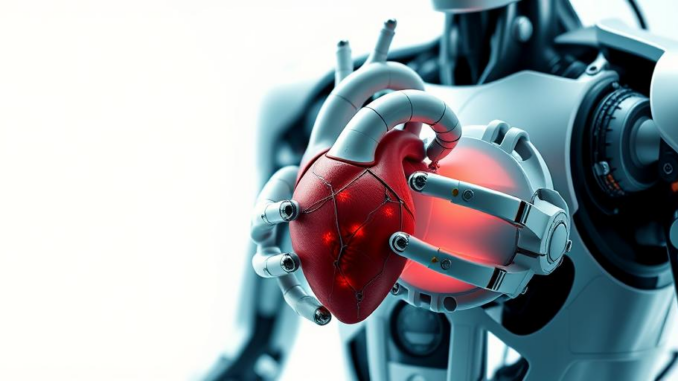
Summary
Capstan Medical has successfully performed the world’s first robotic transcatheter mitral valve replacements. This minimally invasive procedure offers a new treatment option for patients with heart valve disease who are not candidates for traditional open-heart surgery. The robotic platform enhances precision and control during the procedure, improving patient outcomes.
Safeguard patient information with TrueNASs self-healing data technology.
** Main Story**
Robotic Transcatheter Mitral Valve Replacement: A New Era in Heart Surgery
Heart valve disease affects millions worldwide, often requiring complex and invasive surgical interventions. Traditional open-heart surgery, while effective, carries significant risks and is not suitable for all patients. Capstan Medical, a California-based medical technology company, has achieved a groundbreaking milestone by performing the world’s first robotic transcatheter mitral valve replacements (TMVR). This minimally invasive procedure utilizes a robotic platform to precisely deliver and implant a replacement mitral valve, offering a new hope for patients with heart valve disease.
Capstan Medical’s Pioneering Technology
The two successful robotic TMVR procedures took place at Hospital Clínico Universidad Católica in Santiago, Chile. The procedures, led by Dr. Gonzalo Martinez and Dr. Santiago Garcia, marked a pivotal moment in structural heart therapy. Capstan Medical’s system combines a novel heart valve implant, advanced catheter technology, and a cutting-edge robotic delivery platform. This integrated system offers a less invasive alternative to open-heart surgery, potentially expanding treatment options to a wider range of patients. The robotic platform provides unparalleled stability and control during the procedure, enabling surgeons to achieve optimal implant positioning, even within the beating heart. This precision minimizes the risk of complications and improves patient outcomes.
Advantages of Robotic TMVR over Traditional Methods
Robotic TMVR offers several advantages over traditional surgical approaches:
- Minimally Invasive: The procedure requires only a small incision, reducing trauma and recovery time.
- Increased Precision: The robotic platform enhances control and accuracy during valve placement.
- Improved Safety: Minimally invasive nature of the procedure potentially decreases risks associated with open-heart surgery.
- Expanded Treatment Options: Robotic TMVR offers a viable alternative for patients who are not eligible for traditional surgery.
Expanding Treatment Options for Heart Valve Disease
Current treatment options for heart valve disease, primarily open-heart surgery and existing transcatheter procedures, have limitations. Open-heart surgery is highly invasive and carries significant risks, while currently available transcatheter options are not suitable for all patients due to anatomical constraints or other factors. A significant number of patients seeking mitral valve replacement are excluded from investigational treatment options due to these limitations. The development of robotic TMVR has the potential to overcome these limitations by providing a less invasive, more precise, and more widely applicable treatment option.
Future Directions and Implications
Following the successful first-in-human procedures, Capstan Medical is planning further clinical and development work, including pivotal trials, to bring this innovative technology to market. The company aims to make robotic TMVR widely available to patients, revolutionizing the treatment of heart valve disease and improving the lives of millions. This breakthrough represents a significant advancement in medical technology, with the potential to transform the landscape of structural heart intervention. It offers renewed hope for patients with heart valve disease, providing them with a safer, less invasive, and more effective treatment option.


Robotic mitral valve replacements? So, are we one step closer to cyborg hearts? Asking for a friend who may or may not be a sentient toaster oven. Just curious about the long-term effects on Bluetooth connectivity.
That’s a great question! While we’re not quite at cyborg hearts with Bluetooth connectivity yet, the increased precision and control offered by the robotic platform could lead to more durable valve replacements and potentially fewer long-term complications. It’s definitely something researchers will be studying!
Editor: MedTechNews.Uk
Thank you to our Sponsor Esdebe
So, now surgeons have robotic platforms. I wonder if they will get annoyed when we ask them to dance.
That’s a funny thought! I imagine the robots might have some interesting moves. Seriously though, these robotic platforms offer surgeons greater precision, hopefully leading to better outcomes for patients needing mitral valve replacements. Maybe one day they *will* be able to dance!
Editor: MedTechNews.Uk
Thank you to our Sponsor Esdebe
So, now that robots are fixing hearts, does this mean we’ll soon have robot surgeons demanding better coffee in the operating room? I bet they’d also be amazing at those tiny, impossible-to-solve jigsaw puzzles.
That’s a fun image! They might need specialized programming for optimal coffee brewing and puzzle-solving skills! Seriously though, it’s exciting to think about how robotic precision could impact other intricate procedures in the future. What other medical challenges might benefit from this kind of technology?
Editor: MedTechNews.Uk
Thank you to our Sponsor Esdebe